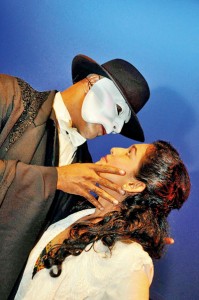Phantom fever
All of Colombo (and the suburbs) is probably singing some version of “Masquerade” or “All I Ask of You” by now. The Phantom of the Opera is officially an epidemic. From the lights to the glitz and glam and the mystery and horror, the Workshop Players’ Production of the longest running (and probably the best loved) musical, seems to be raising the bar for English language theatre in Sri Lanka.
The thing about this musical is the glamour. It is France after all. And Jerome de Silva and his crew have indeed pulled out all the stops, with a myriad electric candles lighting up the Phantom’s lair, larger-than-life drapes and massive props to set the stage. But the chandelier (literally) looms over it all, swinging high over the unsuspecting audience, filling the Lionel Wendt theatre with light and transporting us to the turn of the twentieth century. Much more subtly, the lights crew flick switches and spew smoke, playing impressively with depth and colour, and claiming all bragging rights with a single spot at the end of the play. The effects are simply ethereal.
At times one is prone – as the voice warns us before it all begins – to suffer some shock. Are the flashing (and ill-timed on Saturday the 4th evening) strobes absolutely necessary? Is the excitement high enough for us to reconcile ourselves to a few seconds of blindness after the sudden flares? But then again, does not our familiar Phantom’s sense of intensity border on the insane?
Jehan Aloysius’ portrayal of the masked maestro is suitably tinged with the neurotic. His half-hidden face twisted in a passion, he delivers with a conviction and force unmatched by the rest of the cast – again, drawing attention to the singularity of the Phantom’s existence. Though some say Manoj Singanayagam acting drew more hearts, it is undeniable that Aloysius’ singing and strength of voice are unparalleled in the role.
His chosen prima donna, Christine Daae – played by Dimitri Gunatilake on Saturday the 4th – on the other hand is sometimes drowned out by the backing track (expertly put together by the master Ranga Dassanayake by the way). Far from being criticism, it must be said that it is simply the gentleness and control of Gunatilake’s execution of her lines that renders her inaudible. Her physical demeanour sometimes borders on farce, but the tone of her voice surprises in the beauty of its sculpting.
Raoul, our heartthrob of the evening, typically draws no special attention. But it is not easy to pull at heartstrings with one of the best-known love songs from Broadway without an exceptional ease and familiarity, and one must say the task was managed in good fashion. Carlotta on the other hand, is simply spectacular. Pomp, flair, her nose in the air, Kumudini David colour-washes every single other performer out with her command of the stage and the score. And in contrast, with a quiet confidence and maturity of performance available only to those as experienced as herself, Shanuki de Alwis commands as actress, the respect and mystifying awe due Madame Giry.
The thrillingly flamboyant costumes of the opera crew absolutely live up to expectation, providing glamour overdone to the T. More fantastic work behind the scenes make fluid scene changes, all coming together to create a seamless re-enacting of one of the most compelling stories Andrew Lloyd Webber put to music.
The Workshop Players have outdone themselves and produced an impressive conclusion to a truly momentous task.
Tonight, as the curtains go up for the last time, on (what the Workshop Players claim is) the first amateur production of the Phantom of the Opera in all of Asia, the tale of the theatre will be told. Not simply of the Opera Populaire, but also what is very likely to be a turning point in Sri Lanka’s production of musical theatre.


